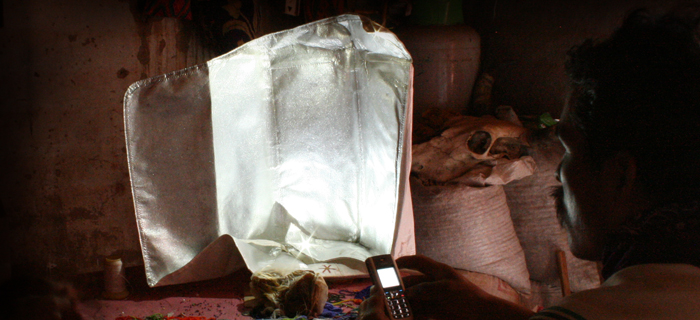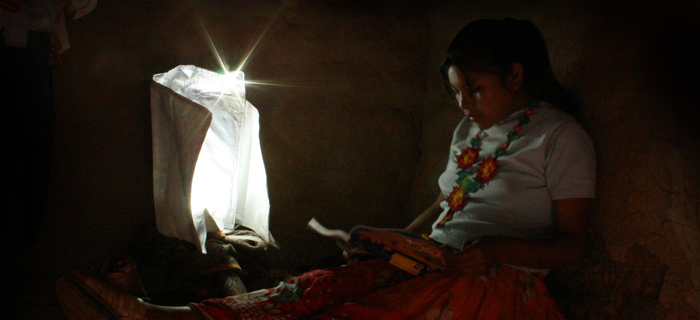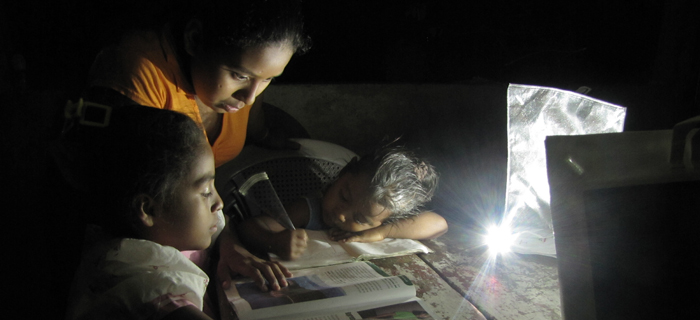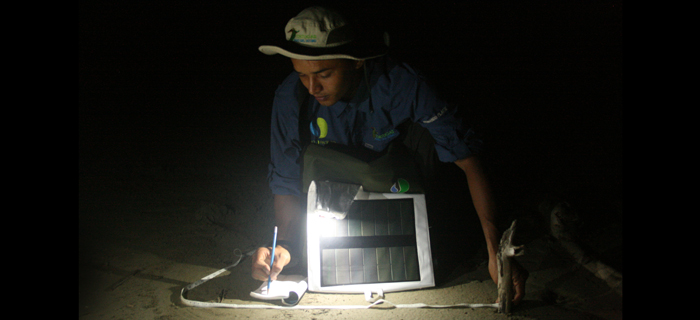Portable Light
Empower People.
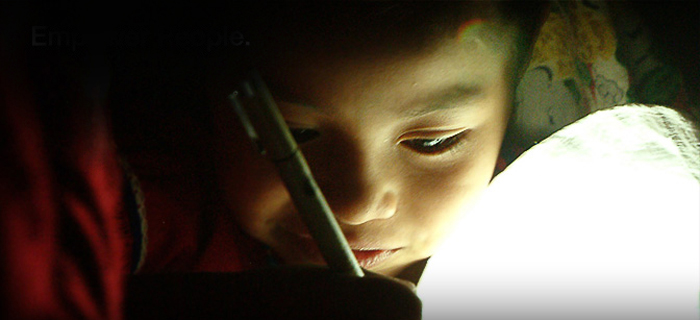
The Portable Light Project enables people in the developing world to create and own energy harvesting textiles, providing the benefits of renewable power as an integral part of everyday life.
Learn MoreLuz Portatil Prototypes tested in the Amazon
The Luz Portatil Brasil team met in Santarem, Para with project partners Fabio Rosa/IDEAAS and Davide Pompermaier of Projecto Saude e Alegria (PSA). The team presented the first Luz Portatil prototypes for discussion at public meetings in Caboclo Communities on the Tapajos and Arapuins rivers of the Amazon, an area which encompasses one of the Amazon’s largest Extractive Reserve regions. The Caboclo people, the largest group of Amazon inhabitants in Brazil (estimated by Greenpeace to be 6 million) are forest dwellers of Amerindian and Portuguese descent, who depend on the river ways and forest for food, livelihoods, shelter and medicines. Most river communities do not have access to electricity; others use the government program “Luz Para Todos”, which imports and sells diesel-generated electricity at monthly fees of 15 Reis for three hours of light per day.
First Solar Textiles for Luz Portatil Brasil
Coopa Roca, the well known women’s artisan group from Rocinas, the oldest favellas in Rio de Janiero, is sewing the solar textiles for Luz Portatil Brasil. This July, the Portable Light team met at Coopa Roca to discuss the patterns with the seamstresses and pick up the first set of solar textiles. It was inspiring to see the Coopa Roca studio; from here you have one of the best views of Rio and the ocean. The women of Coopa Roca work collaboratively using their artisanal skills to earn money so they can plan their lives and take care of their families. Many have strong family ties to the north of Brazil, where the solar textiles they have made will be used by people in isolated River Communities in the Amazon region. In this way, Luz Portatil Brasil benefits two communities—one in the south, the other in the north of Brazil. Read more about the PL Brazil project here.
Portable Light Named to World’s Top 100 NGO List
The Global Journal of Geneva, Switzerland has named the Portable Light Project to their top 100 NGO list, an international ranking of the world’s non-profit organizations that are making significant contributions to global governance. The Global Journal commends the Portable Light Project’s integrated approach of “intersecting energy and mobility with low carbon processes” as crucial in a world fraught with conflict, global warming and rapid urbanization.
Portable Light Wins 2012 Energy Globe Award
The Portable Light Project was selected among over 800 entries from all over the world and recognized for best sustainable energy practices in Nicaragua in partnership with NGO Paso Pacifico (link). The ENERGY GLOBE Award was founded in 1999 by the Austrian energy pioneer Wolfgang Neumann and is one of today’s most prestigious environmental awards.
The Buckminster Fuller Challenge Award, 2011
The Portable Light Project has been selected as a semi-finalist award winner for the Buckminster Fuller Challenge, a design prize for innovation inspired by the exploration, discovery, invention and teaching of Buckminster Fuller. Fuller ‘s pioneering approach at solving complex problems combined an emphasis on individual initiative with whole systems thinking, scientific rigor and understanding of nature's underlying principles.
Loop Lantern Prototype @ PUC RJ
Patricia Gruits and Heather Micka-Smith travelled to Brazil this October, to conduct a Portable Light studio workshop on solar textiles with students and faculty at PUC in Rio de Janiero. A new design, the Loop Lantern was unveiled by the PL team and developed in collaboration with students under the direction of PUC Design Professor Luiza Novaes. The Loop Lantern unfolds from a very compact, flat solar charging footprint to two different illumination positions. One is a hanging conical volume that reflects light for general room illumination –think: lampshade, but without the incandescent bulb, of course—the other folds to form an instant, portable office space where people can study, write or charge a cell phone.
The intensive studio workshop session at PUC, which attracted a large number of Brazilian design and fashion students, addressed the basics of Portable Light pattern making, photovoltaic technology integration and flat to form fabrication for solar textile lanterns.
New Light Levels and a Battery that Talks to You
We’ve made a number of upgrades to our Portable Light flex kit. There are three LED light levels on the upgraded kit and the team has been conducting several weeks of round-the-clock light level tests. With a fully charged battery (six hours of sunlight) the low light (reading, ambient) runs for 20 hours, the medium light (tasks, illumination) runs for 10 hours and the high light (> 100 lumens for way finding or spot light) runs for 3 hours.
Four Geographies
There are four global geographies that can be associated with lack of energy access and poverty. 1. Rugged mountainous/arid zones increase costs of transport and civil engineering necessary for centralized electricity. 2. The densely populated edges of rapidly urbanizing mega-cities attract people who migrate in search of work, and settle in barrios, favellas, and shantytowns often with irregular/no access to electricity. 3. Oceanic islands and isolated coastlines form another key geography, isolated both by distance and limited governmental access to funds. 4. Global tropic zones, especially rainforest/river systems constitute another type of geography where water, heat, rain and humidity sequester carbon but can erode electronics. Each of these geographies has its challenges, and often these conditions overlap, as we see in Amazon cities such as Manaus or Santarem.
Solar Handbag Designs Selected for ELLE Gold Awards 2010
Visit ELLE.com to read more about the award winning collaboration between KVA MATx and top designers to create the ELLE/Portable Light Project bags.
Portable Light Project @ TED
The Portable Light Project is on exhibit at TED in Long Beach, CA. The Portable Light solar textiles were selected by TED as one of two innovative energy projects that are changing the future of energy in the developing world. Portable Light Founder Sheila Kennedy, a professor of Architecture at MIT joins fellow MIT Professor Amy Smith who is exhibiting her charcoal fuel project in this event!
